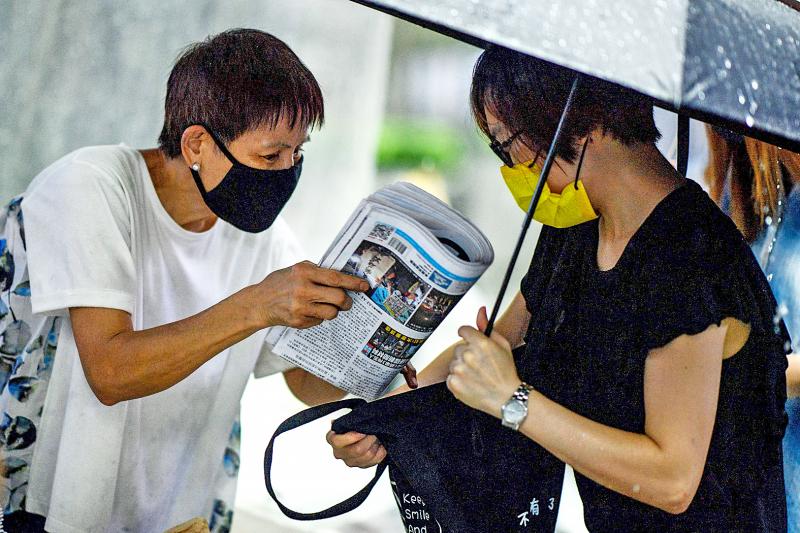Hong Kong cyberactivists are backing up articles by pro-democracy tabloid Apple Daily on censorship-proof blockchain platforms after the newspaper was forced to shut down as it became embroiled in a National Security Law crackdown.
The latest drive to preserve the paper’s content comes after advocates rushed to upload documentaries by Radio Television Hong Kong (RTHK) investigating people in power after the media outlet said that it would remove materials older than one year from its social media platforms.
Under the national security legislation, the Hong Kong government can request the blocking or removal of content it deems subversive or secessionist, raising fears over Internet freedom in the territory.

Photo: AFP
The Hong Kong government has said that use of the Internet would not be affected so long as its use was within the law.
“Law enforcement actions taken by Hong Kong law enforcement agencies are based on evidence, strictly according to the laws of Hong Kong, and for the acts of the person(s) or entity(ies) concerned,” a Hong Kong National Security Bureau spokesman said in a statement.
This year, the firm that approves Internet domains in Hong Kong said that it would reject any sites that could incite “illegal acts.”
Internet service provider Hong Kong Broadband Network said that it had blocked access to HKChronicles, a Web site offering information about democracy protests.
Fearing the national security legislation could bring elements of China’s “Great Firewall” to Hong Kong, limiting access to dissenting views, 21-year-old Ho — who works in tech and did not give his first name because of the sensitivity of the matter — began this week to upload Apple Daily articles on decentralized file storage platform ARWeave.
After midnight, as the printers ran one final time, Apple Daily shut off its Web site and erased all of its social media platforms after authorities froze company-related assets as part of a national security probe.
“I’m not doing this because I love Apple Daily. It’s what needs to be done,” Ho said. “I never thought that Apple Daily would disappear so quickly.”
Police had frozen assets of companies linked to Apple Daily and last week arrested five executives, moves that led to the newspaper printing its final edition yesterday.
Authorities said that dozens of Apple Daily articles might have contravened the national security legislation, but there was no suggestion that Apple Daily content would be blocked or censored.
Similar to BitTorrent, ARWeave breaks down a file into bits of information distributed over an open network of anonymous computers around the world.
On its Web site, it describes itself as a “collectively owned hard drive that never forgets.”
As of yesterday, more than 4,000 Apple Daily articles had been uploaded on ARWeave. Hundreds of RTHK programs dating back to 2012 are also available.
Another programmer, Kin Ko (高重建), 47, has been building a decentralized registry called LikeCoin.
Ko’s initial idea was to create a platform that could authenticate any type of content, and did not expect it to be embraced so enthusiastically by democracy advocates.
However, he said that “history must not be determined by those in power.”

Kehinde Sanni spends his days smoothing out dents and repainting scratched bumpers in a modest autobody shop in Lagos. He has never left Nigeria, yet he speaks glowingly of Burkina Faso military leader Ibrahim Traore. “Nigeria needs someone like Ibrahim Traore of Burkina Faso. He is doing well for his country,” Sanni said. His admiration is shaped by a steady stream of viral videos, memes and social media posts — many misleading or outright false — portraying Traore as a fearless reformer who defied Western powers and reclaimed his country’s dignity. The Burkinabe strongman swept into power following a coup in September 2022

‘FRAGMENTING’: British politics have for a long time been dominated by the Labor Party and the Tories, but polls suggest that Reform now poses a significant challenge Hard-right upstarts Reform UK snatched a parliamentary seat from British Prime Minister Keir Starmer’s Labor Party yesterday in local elections that dealt a blow to the UK’s two establishment parties. Reform, led by anti-immigrant firebrand Nigel Farage, won the by-election in Runcorn and Helsby in northwest England by just six votes, as it picked up gains in other localities, including one mayoralty. The group’s strong showing continues momentum it built up at last year’s general election and appears to confirm a trend that the UK is entering an era of multi-party politics. “For the movement, for the party it’s a very, very big

ENTERTAINMENT: Rio officials have a history of organizing massive concerts on Copacabana Beach, with Madonna’s show drawing about 1.6 million fans last year Lady Gaga on Saturday night gave a free concert in front of 2 million fans who poured onto Copacabana Beach in Rio de Janeiro for the biggest show of her career. “Tonight, we’re making history... Thank you for making history with me,” Lady Gaga told a screaming crowd. The Mother Monster, as she is known, started the show at about 10:10pm local time with her 2011 song Bloody Mary. Cries of joy rose from the tightly packed fans who sang and danced shoulder-to-shoulder on the vast stretch of sand. Concert organizers said 2.1 million people attended the show. Lady Gaga

SUPPORT: The Australian prime minister promised to back Kyiv against Russia’s invasion, saying: ‘That’s my government’s position. It was yesterday. It still is’ Left-leaning Australian Prime Minister Anthony Albanese yesterday basked in his landslide election win, promising a “disciplined, orderly” government to confront cost-of-living pain and tariff turmoil. People clapped as the 62-year-old and his fiancee, Jodie Haydon, who visited his old inner Sydney haunt, Cafe Italia, surrounded by a crowd of jostling photographers and journalists. Albanese’s Labor Party is on course to win at least 83 seats in the 150-member parliament, partial results showed. Opposition leader Peter Dutton’s conservative Liberal-National coalition had just 38 seats, and other parties 12. Another 17 seats were still in doubt. “We will be a disciplined, orderly